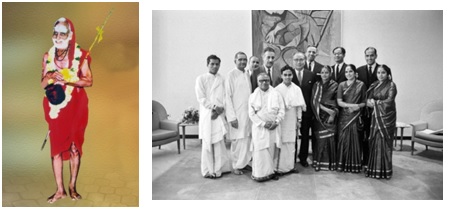The Tamil month of Margazhi is great for a variety of reasons: even Bhagavan Krishnan says -
‘Masanam marga shirshah aham’ – ‘of the months, I am Margazhi’. For those of us who live in or visit Chennai in this month, it is a unique opportunity to participate in two events: the ‘season’ in Chennai and Mahaswamigal Aradhana. The ‘season’ that really lasts six weeks in December and January is one of the world’s biggest cultural extravaganzas covering thousands of artists performing in scores of sabhas, principally, carnatic music. The ‘Aradhana’ is the annual reverential homage to Kanchi Sankaracharya Sri Chandrasekarendra Saraswathi Swamigal, appropriately called ‘Mahaswamigal’ – this year it falls on 18th December 2014.

‘Maitreem Bhajatha’: Mahaswamigal’s composition for MS Subbulakshmi
Margazhi is therefore an appropriate time to throw one’s mind back to a unique occasion that involved one of the greatest carnatic musicians, in fact the only one to have been conferred Bharat Ratna title and the Mahaswamigal: M S Subbulakshmi’s music concert on the UN Day at the United Nations, New York, in October 1966. The singer, the occasion and the location all made this an unparalleled event: but, even by its standards, the concluding piece, ‘Maithreem Bhajatha’, was truly historic climax, thanks to the underlying message and the composer, the Paramacharya himself.
When M S Subbulakshmi had been invited to sing in United Nations, she sought the blessings of Kanchi Paramacharya, who composed this song for the occasion. This was the concluding piece and the elite audience, which included the then UN Secretary General U Thant, had been given the meaning of the song. The standing ovation that MS received at the end was as much an act of reverence to the Great Guru and his message for world peace as it was a tribute to the most world-famous Carnatic singer. For the rest of her life, often, this was MS’s ‘mangalam’ piece at the end of her concerts.
It was truly a case of Divine Music composed by Divinity himself!
The song is in Sanskrit: given below is the English transliteration and meaning:
Maithreem Bhajatha , Akhila Hrujjethreem,
Atmavadeva paraanapi pashyatha
Yuddham thyajatha , Spardhaam Tyajata,
Thyajatha Pareshu akramamaakramanam
Jananee Pruthivee Kaamadughaastey
JanakO Devah Sakala Dayaaluh
Daamyata Datta Dayadhvam Janathaah
Sreyo Bhooyaath Sakala Janaanaam
Translations do not do justice to the grandeur of the occasion, the greatness of the music, or, the sublimity of the message, and yet, for those of us not proficient in Sanskrit, they do help.
“Cultivate friendship, which will conquer all hearts
Look upon others as thyself
Renounce war; forsake competition
Give up aggression on others which is wrong (because)
The Great Mother earth yields all our desires
Our Lord, our Father is compassionate to all
Ye peoples of this world - restrain yourselves, donate and be kind,
May all the people be happy and prosperous”
The song’s message is addressed to nations and peoples, but, the core exhortations are meant for all of us as individuals: cultivate friendships that conquer all hearts; look upon others as yourself; don’t be aggressive or greedy as Nature is bountiful for all of us; be gentle and kind and generous; and, most importantly, wish everyone to be happy and prosperous.
There is no better of way of wishing all SIS members and patrons season’s greetings and health, happiness and prosperity for the New Year.